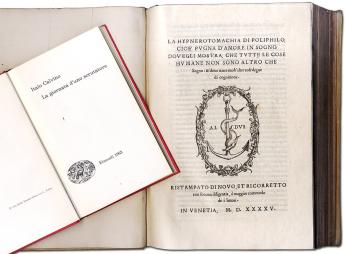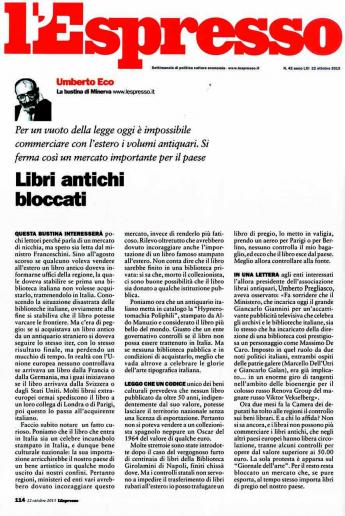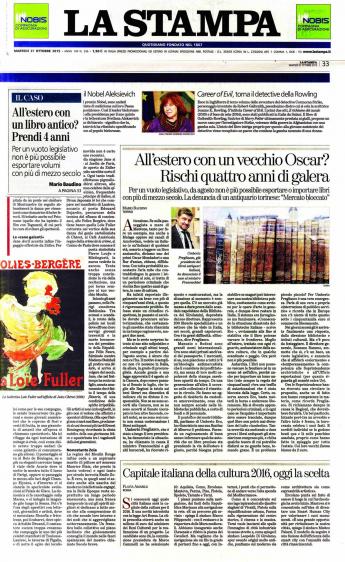Associazione Librai Antiquari d'Italia
Italian Borders Closing On Rare Books

By Umberto Pregliasco
News from Italy: With local authorities no longer in charge of heritage protection, it is now illegal to export from Italy any book printed before 1965.
Until August 2015, under Italian law, anyone owning a book older than 50 years and wanting to export it from Italy, was required to apply for an export license to the competent regional authority.
On August 6th, the Italian Parliament approved a law on the reorganization of local governmental departments. The law 125/2015 repeals the paragraph of the Italian Heritage Code granting Regions the authority to carry out heritage protection on books and manuscripts; and provides for such authority to be "subject to specific agreements with the State". Alas, no specific agreements have been made so far and nobody can tell when, where and how these agreements will be finalized.
Meanwhile, the regional authorities have declared that they no longer have the power to receive the applications neither to issue export licenses, nor authorize restorations, exhibitions or the relocations of books and manuscripts. The Cultural Heritage Ministry confirmed that regional authorities will be able to grant export licenses requested up to August, 14th. Unfortunately, no provision is given for export requests filed after that date.
This deadlock situation makes it impossible to legally export any book published before 1965 and is causing great distress to Italian booksellers, who find themselves even more penalized when competing with their foreign colleagues. In Germany, France and Great Britain no license is needed to export any book printed after 1500, as long as its value is below 50.000 €. Italian Heritage Protection, on the contrary, was particularly harsh even before this legislative void. No book older than 50 years could be exported without a license, regardless of its price (even a common paperback from the early '60s, with little if any commercial value). Violations were punished with prison up to 4 years.
The present situation is totally uncertain and will scare away Italian collectors from selling their books. And, furthermore, bibliophiles from abroad, and even ordinary foreign tourists, will no longer be able to buy used books in Italy. The old approach was already conceived to humiliate Italian rare books dealers, wilfully ignoring their important role in promoting Italian culture abroad. This new law (or, at least, the legislative gap in it) will kill the commerce of Italian rare books.
The Italian ALAI Committee sought legal advice and sent a letter to the Minister, to the general director of the Italian libraries and to other top government officials involved in cultural heritage, encouraging them to solve this matter, so essential to the survival of our profession. The ALAI is concerned that the Parliament does not care to think about its fatal consequences for Italian book dealers. Every year, our colleagues had to submit thousands of antique (or just old) books to local authorities, to have them studied and photographed for exporting. When will we know to whom, and where, we must go from now on?
When I served as the president of the ALAI I tried hard to improve the cooperation with the Cultural Heritage Ministry, to no avail. The presidents who followed me, Fabrizio Govi (2011-2015) and the recently elected Marco Cicolini, kept on this effort but they could obtain little more than empty promises. Moreover, they had to manage a difficult situation due to what happened in the Girolamini Library in Naples. It is peculiar that the Ministry had chosen a person like Massimo De Caro to manage such an important library. Already embroiled in a corruption scandal in the energy sector involving Renova Group and Russian tycoon Viktor Vekselberg, De Caro had no title for such an office and even bragged about a fake graduation. Nevertheless, he got the position thanks to the backing of two well-known Italian politicians, Marcello Dell'Utri and Giancarlo Galan, both of them currently in prison.
Despite a seven-year embezzlement sentence from Italy's Supreme Court, De Caro is enjoying his house arrest on the hills around Verona, “in confined splendour in the villa, which he had bought in 2009 for 1.25 million euros” (12.16.2013, The New Yorker). Extremely proud of his forgeries on Galileo’s books, De Caro “compared himself to Nobel laureates” (ibid.) and, well knowing that giving information about the bribes which used to run along the Russian gas pipeline would be too dangerous, he prefers to talk about stolen books, granting interviews, writing rants on Facebook: “I want to take [charge of] the security of Libraries. In this regard I am working with an international first level company on two very important projects”: He tries to sell rare volumes under his mother’s account and even offers to put his "experience" (!) at the service of law and of ILAB, in order to help preventing thefts and counterfeiting of books: “I think that would be important if the Committee of ILAB-LILA support me in my effort to clean the antique books market … I'll do it for the love of the books we have in common” (! The glorious motto of ILAB is since 1948 Amor Librorum nos unit).
As Conchita Sannino put it on "La Repubblica", the second most read newspaper in Italy: "The story about the former thief, sentenced but free, is a little but iconic tale: a symbol of a State which can neither preserve its treasures, nor punish its traitors".
***
This article was first published in the Italian language in Il Giornale dell’Arte. It is presented here in an English translation by Umberto Pregliasco and with his permission. Picture: Umberto Pregliasco.
In the Press
Meanwhile, there is a big discussion about the new legislation and its enormous problems for the Italian and international antiquarian book trade in the press. Umberto Eco - author, scholar, bibliophile, ALAI and ILAB Patron of Honour - and Umberto Pregliasco have published articles and statements in prominent Italian newspapers.
>>> Click right on the pictures to enlarge and have a look.
>>> Read Umberto Eco's article "Libri antichi bloccati" on the ALAI website.


